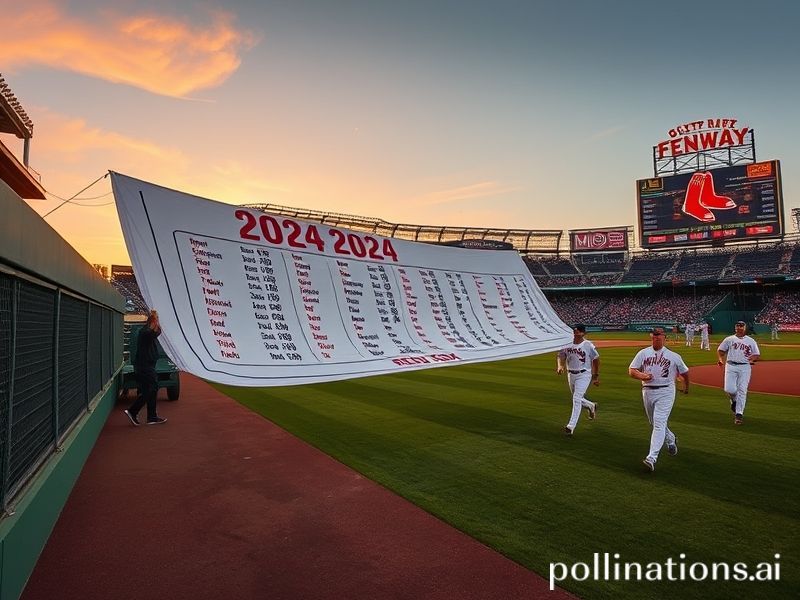Global Dominoes: How the Red Sox Schedule Quietly Runs the World Economy (and Your Vacation Plans)
Red Sox Schedule: How 162 Games of American Pastime Quietly Dictate the Planet’s Supply Chains, Diplomatic Timetables, and Your Cousin’s Wedding
By the time Fenway Park’s ancient PA system crackles to life on Opening Day, the reverberations are felt well beyond Boston’s clam-chowder belt. In Singapore, a container-load of David Ortiz-branded oven mitts is rerouted to beat the port strike that always—mysteriously—aligns with the Sox’s first home stand. In Brussels, EU trade negotiators suddenly find “family emergencies” when they realize Game 5 of the ALCS might overlap with their summit on digital tariffs. And in rural Guatemala, coffee growers check the Red Sox schedule before setting harvest dates, because nothing depresses Boston’s caffeine demand like a four-game sweep in late September.
To the untrained eye, the 2024 Red Sox schedule is merely a spreadsheet of 81 home dates and 81 away, peppered with obligatory flights to Toronto (where customs agents still ask if you’re smuggling maple-flavored steroids) and to London, because MLB’s marketing department insists the British deserve nine innings of existential angst to go with their Brexit. Yet the calendar’s tidy rows are actually fault lines in the global economy. Book a cargo flight out of Logan the night after the Yankees come to town and you’ll pay a premium equal to the GDP of Tuvalu; every freight pilot within 500 miles is busy airlifting “Yankees Suck” T-shirts to secondary markets from Reykjavík to Riyadh.
Consider the geopolitical choreography: when the Sox visit Houston, West Texas Intermediate crude futures tick upward—statisticians swear it’s coincidence, but the pipeline schedulers know better. Meanwhile, the Japanese Ministry of Trade quietly adjusts its ball-bearing quotas because half of Nagoya’s middle management will be asleep at their desks after staying up to watch Masataka Yoshida face his old club. One man’s seventh-inning stretch is another nation’s balance-of-payments crisis.
The schedule even weaponizes nostalgia. Every August, as Boston descends into clammy despair over pennant-race math, European streaming services experience a suspicious spike in VPN traffic from Massachusetts expats pretending to be in Düsseldorf to watch blackout-free games. The European Commission, ever vigilant, has begun drafting the “Baseball Broadcast Equity Directive,” which sounds dull but contains a clause allowing Brussels to seize your pretzels if you’re caught spoofing your IP after the 8th inning.
Of course, the schedule’s cruelest trick is on the human heart. A wedding planned for October 6th in Barcelona—innocent enough until some cousin realizes it collides with a potential Wild Card game. Divorce lawyers from Cape Cod to Catalonia now list “postseason conflict” on intake forms. Love, it turns out, is no match for a knuckleball and a bar full of homesick Sox fans chanting “Sweet Caroline” at 3 a.m. local time.
There is, hidden among the line scores, a lesson about modern interconnectedness: We no longer merely watch baseball; we outsource our anxieties to it. Supply-chain managers, central bankers, and lovelorn fiancés all lean on the same 162-game oracle. When the schedule drops each winter, it’s less a sporting announcement than a planetary weather forecast—except the storms are measured in OPS and the only umbrella is a $12 stadium beer that tastes like aluminum regret.
So, as the Red Sox prepare to slog through interleague play against teams whose mascots sound like failed boy bands (looking at you, Guardians), take a moment to appreciate the quiet grandeur of it all. Somewhere, a customs official in Dublin is clearing shipments of green-clad rally monkeys timed to coincide with a Fenway series against Oakland. Somewhere else, a drone pilot in Djibouti is rerouting medical supplies because the usual air corridor is choked with charter flights full of Bostonians who swear this is the year.
And when the final out is recorded—probably sometime in early October, unless the bullpen melts down like a popsicle in a sauna—the world will exhale in unison. Cargo rates will settle, diplomats will reschedule, and your cousin will finally get married, assuming the best man isn’t stuck in a Logan security line behind someone trying to smuggle a Wally the Green Monster plushie stuffed with clam chowder. The global economy will reset, the planet will spin on, and somewhere in the dark, the 2025 schedule is already being penciled in by some poor intern who still believes numbers are just numbers. Poor kid.







